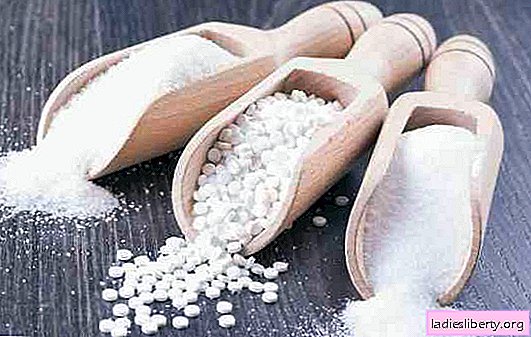
Obesity is a serious public health problem worldwide. Surveys constantly show that people are concerned about their own weight. The primary goal of diabetes care is to control your blood glucose. Consumers have a wide selection of food products. The food industry has discovered several forms of alternative intense sweeteners that are calorie-free.
Patients are advised to reduce their sugar intake, but not completely replace it with a sweetener. Artificial sugars have the desired sweetness, but are not digested in the human body and therefore do not give energy. Some of them can cause irreparable harm to health.
Aspartame: is it harmful or safe?
Aspartame is a low-calorie sweetener used to sweeten a variety of foods and drinks. It contains 4 calories per gram.
Aspartame is unstable during prolonged heating, so it cannot be used for baking or cooking. It also decomposes in liquids during storage.
When swallowed, aspartame breaks down into natural residual components, including aspartic acid, phenylalanine, and methanol.
Further, formaldehyde, formic acid and diketopiperazine are formed from them.
The European Food Commission's scientific committee considers aspartame to be safe for human consumption. It is approved for food purposes in more than 90 countries.
Is acesulfame toxic?
Acesulfame is not digested in the human body, therefore, does not contain calories and does not affect the concentration of potassium in the blood.
In 1988, the USFDA approved the use of Acesulfame in various dry foods and alcoholic beverages.
In 2003, the same agency approved it as a general purpose sweetener.
One of the decomposition products of the sweetener is acetoacetamide, which is toxic in very large doses. However, very little acetoacetamide is formed from Acesulfame, therefore it is safe.
Sucralose causes neurological disease?
Although sucralose is made from sugar, the human body does not digest it. The bulk of the consumed sucralose is excreted directly with feces.
The amount that is absorbed from the gastrointestinal tract is largely removed from the bloodstream by the kidneys.
In determining the safety of sucralose, the FDA analyzed data from more than 110 studies in humans and animals.
Many of the studies have been designed to identify possible toxic effects.
However, no carcinogenic, reproductive and neurological effects have been identified.
Saccharin and cancer: is there a connection?
The FDA attempted to ban saccharin in 1977 because animal studies showed that it caused bladder cancer in rats.
Since then, much research has been done on saccharin. Some trials have shown a correlation between consumption and cancer frequency, however they were later disproved.
Even in excessively high doses, saccharin does not cause cancer in humans.
Therefore, it can be used without fear for their own health.
Sodium cyclamate and diabetes
Cyclamate exhibits very low toxicity, but is digested by intestinal bacteria into cyclohexylamine. The latter substance can increase the risk of developing diabetes mellitus and arterial hypertension.
Research on the effects of cyclamate on the human body is ongoing.
In 2017, scientists provided new data on the extent to which people convert cyclamate to cyclohexylamine. The experiment gives the first true indication of the possible harmful effects of the sweetener on humans.
Are there beneficial and safe sweeteners?
Stevia is a natural herb that contains healthy steviol glycosides that are 10-15 times sweeter than sucrose. The human body does not digest these sweet glycosides, so it does not get calories from stevia.
Unlike an artificial sweetener, a sweet glycoside does not break down when heated. Therefore, steviol glycosides can be used for cooking hot foods and baking.
Studies have shown that stevia can lower high blood pressure.
According to a Norwegian clinical trial, the plant significantly improves the condition of patients with type 2 diabetes.
In moderate doses, most sweeteners are safe for health. Before use, it is recommended to consult with a nutritionist and diabetologist.











